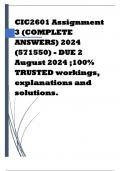CIC2601 Assignment
3 (COMPLETE
ANSWERS) 2024
(571550) - DUE 2
August 2024 ;100%
TRUSTED workings,
explanations and
solutions.
,Part 1: Understanding ICT Integration in South African Schools (40
marks) 1. Define ICT (Information and Communication
Technologies) and explain why its integration is crucial in the
context of South African education. [10] 2. Identify and elaborate on
three significant challenges faced by South African schools when
integrating ICTs into their educational framework. Provide specific
examples if available. [15]
Part 1: Understanding ICT Integration in South African
Schools (40 marks)
1. Define ICT (Information and Communication Technologies)
and explain why its integration is crucial in the context of South
African education. [10]
Definition of ICT:
1. Technological Tools and Resources: ICT encompasses
various technologies used for processing and communicating
information.
2. Includes Computers and Internet: Key components of ICT
include computers and internet connectivity.
3. Broadcasting Technologies: ICT also involves broadcasting
tools like radio and television.
4. Telephony: Mobile phones and telecommunication networks
are part of ICT.
5. Information Management: ICT facilitates storing, retrieving,
and managing data.
Importance of ICT Integration in South African Education:
, 1. Access to Information: ICT provides students with access to
vast educational resources, enhancing learning opportunities.
2. Interactive Learning: Technology supports multimedia and
interactive content, making education more engaging.
3. Equitable Education: ICT can bridge educational gaps,
providing quality education to remote and under-resourced
areas.
4. Teacher Training: ICT aids in continuous professional
development for teachers, improving teaching methods.
5. Administrative Efficiency: Digital tools streamline
administrative tasks, allowing more focus on teaching.
6. Global Competitiveness: Familiarity with ICT prepares
students for the global job market.
7. Cost-Effective Solutions: Over time, ICT can reduce costs
related to traditional educational materials.
8. Collaboration and Communication: ICT facilitates better
communication among students, teachers, and parents.
9. Innovative Teaching Methods: Technology supports new
teaching approaches like flipped classrooms and blended
learning.
10. Resource Management: Efficient management of
educational resources is possible with ICT tools.
2. Identify and elaborate on three significant challenges faced by
South African schools when integrating ICTs into their
educational framework. Provide specific examples if available.
[15]
1. Infrastructure Deficiency:
1. Inadequate Electricity: Many schools lack a stable electricity
supply, crucial for running ICT equipment.
2. Poor Internet Connectivity: Limited or no internet access
hampers the use of online resources.




